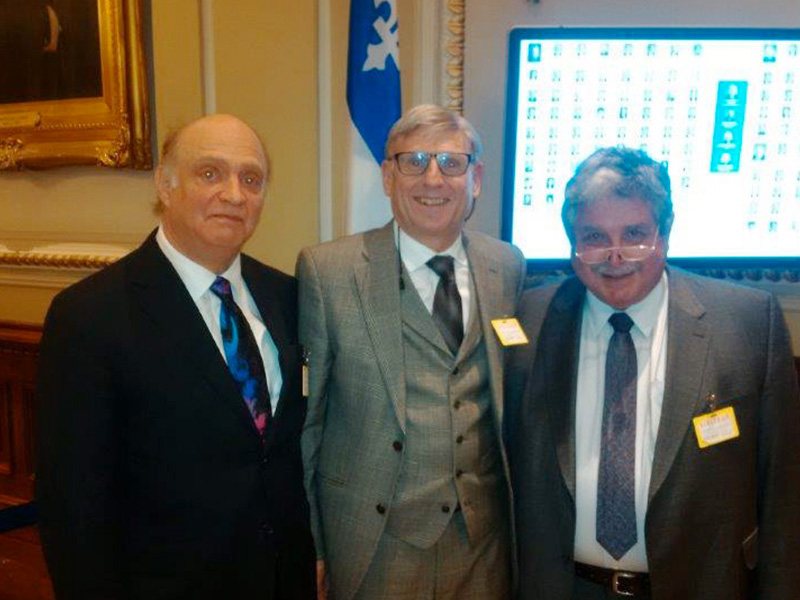An association of Jewish lawyers says Quebec’s Bill 62, which would require public services to be delivered and received with faces uncovered, should be withdrawn because it violates the Canadian and Quebec rights charters.
“Despite the fact that the purpose of the bill is to promote respect for the religious neutrality of the state…the way the bill is drafted, in practice, the opposite may well result,” says the Lord Reading Law Society.
Forcing someone to unveil is counter to the freedoms of religion and expression, the society argues.
The society also believes the proposed legislation could have more far-reaching consequences than intended.
READ: PQ ‘SECULARIZATION’ PLAN SLAMMED BY CRITICS
In a presentation Oct. 27 before the parliamentary commission holding public hearings, society members criticized the bill, and in particular article 4, for its ambiguity. That article could be interpreted as prohibiting the wearing of any clothing, headgear or religious symbols by the staff of public bodies, including those in schools and hospitals.
Article 4 states: “In the exercise of their functions, personnel members of public bodies must demonstrate religious neutrality. They must be careful to neither favour nor hinder a person because of the person’s religious affiliation or non-affiliation.”
As the society phrases it in its 70-page brief, the bill “breaches the state’s obligation to remain neutral by discriminating against individuals in favour of a kind of ascetic secularism.”
The bill would create “a hierarchy of rights, which is contrary to the Canadian and Quebec tradition, and could jeopardize fundamental rights and freedoms.”
Appearing at the National Assembly were Frank Schlesinger, chair of the society’s committee on human rights; Theodore Goloff, former president of the society; and Michael Bergman.
Introduced by Justice Minister Stéphanie Vallée, An Act to foster adherence to state religious neutrality and, in particular, to provide a framework for religious accommodation requests in certain bodies, was tabled in the National Assembly in June 2015.
The bill affects those delivering and receiving public services, including health care and education.
At the very least Article 4 should be amended, the society says, to make clear that religious symbols in attire will not be banned.
The bill gives too much discretion to officials and its provisions are “too vague for a person to understand their rights and obligations under the bill.”
The society also objects to the bill’s exemption of “emblematic and toponymic elements” of Quebec’s religious heritage from what is deemed to compromise state neutrality. The society wonders if this refers only to its Christian heritage and ignores the contributions of minorities.
In summary, the society asserts there is no need for the bill.
“The neutrality of the state is already constitutionally enshrined, not only in the Quebec and Canadian charters, but is also protected by the oaths of office taken by public servants,” the brief states.
Moreover, the principle of reasonable accommodation has already been dealt with in many Supreme Court decisions, the society points out.
The business, health and education sectors have also successfully handled requests for reasonable accommodation, so the intervention of government is “a futile exercise and superfluous,” says the society.
As for students in public schools, they would be put in the “humiliating and tiresome position of having to ask for exemptions and accommodations on a case-by-case and repeated basis.” The effect, the society believes, would be to exclude such students from the public system.
The Centre for Israel and Jewish Affairs-Quebec (CIJA) also appeared before the parliamentary commission, on Oct. 27.
CIJA welcomes the government’s goal of affirming the state’s religious neutrality and agrees that reasonable accommodation should “unconditionally” respect gender equality.
“CIJA-Quebec recognizes that it is important that public bodies prepare a clear framework for accommodations and that any accommodation must only be granted if the request is reasonable,” its brief states.
However, CIJA made some suggestions for amending the bill in order to better meet its objectives.
In the area of public employees’ religious rights, the bill should make clear, in accordance with the jurisprudence, that an employer is obliged to find accommodation for employees’ beliefs or practices, as long as that does not entail “undue hardship” or detract from “justified professional demands.”
CIJA also thinks what constitutes respect for state neutrality when considering accommodation in the workplace should be more precise.
In the public schools, CIJA notes that it has already been established that school boards have a duty to accommodate absences for religious reasons.
It suggests that teachers be informed at the beginning of the school year of the expected absences of any student in order that arrangements can be made to make up the time.
CIJA said it’s concerned by article 16, which prohibits instruction in, or practice of, a single religion or admission based on religion in the Centres de la petite enfance, the government-subsidized daycares. Cultural activities related to religion would be all right.
CIJA points out that religion and culture are directly linked in the Jewish tradition. “We believe these provisions are contrary to the freedom of religion guaranteed by the [Canadian and Quebec charters]. We equally believe that parents have a right to ask for an education for their children that transmits… their cultural heritage.”
That means learning about Jewish history, holidays and customs, CIJA says.
As what type of activity of a religious nature would be permitted is unclear in the bill and would, therefore, be difficult to apply, CIJA says. It would be left up to a bureaucrat to decide whether an activity was authorized or not, CIJA fears, and a negative response could mean the CPE would lose its funding or status.
